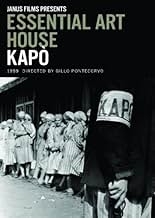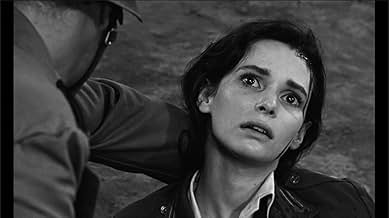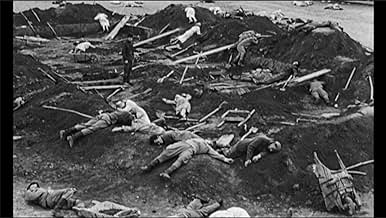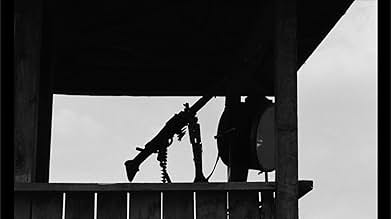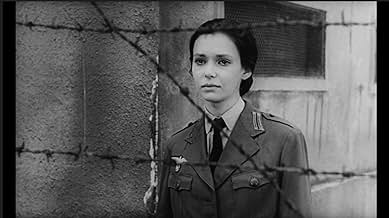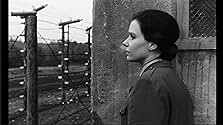Kapò
- 1960
- 1h 57m
IMDb RATING
7.6/10
2.8K
YOUR RATING
A young Jewish girl leads an escape attempt from a concentration camp.A young Jewish girl leads an escape attempt from a concentration camp.A young Jewish girl leads an escape attempt from a concentration camp.
- Nominated for 1 Oscar
- 3 wins & 4 nominations total
Semka Sokolovic-Bertok
- Une detenuta
- (as Semca Sokolovic)
Dirjana Dojic
- Ninette
- (as Dirjana Dojc)
Graziella Durano
- Une detenuta
- (uncredited)
Sima Janicijevic
- Il medico di Auschwitz
- (uncredited)
Rastislav Jovic
- Yanko Milovich
- (uncredited)
Dusan Perkovic
- Il commandante tedesco
- (uncredited)
Featured reviews
I've never really liked holocaust flicks because they get well, usually made so that the dumbest of the dumb to 'get it.' Kapo is just a movie that shows, not tells, which of course makes the best story. Thanks to TCM for playing this gem that I'll buy on DVD as soon as it comes out. I'd never even heard of it, and I have seen a LOT of flicks.
Susan Strasburg does an incredible job as Nicollete / Edith. Her transformation from shell-shocked victim to cynical survivor is absolutely gripping. The tension in the movie builds to nearly unbearable level and the end simply leaves you scooping your jaw off the floor.
This is the type of movie I sorely needed after going on a loooong dry spell of celluloid garbage. Why this movie isn't famous, I have no idea, but it should be.
Susan Strasburg does an incredible job as Nicollete / Edith. Her transformation from shell-shocked victim to cynical survivor is absolutely gripping. The tension in the movie builds to nearly unbearable level and the end simply leaves you scooping your jaw off the floor.
This is the type of movie I sorely needed after going on a loooong dry spell of celluloid garbage. Why this movie isn't famous, I have no idea, but it should be.
As with my recent viewing of Bernhard Wicki's THE BRIDGE (1959), I was introduced to the film under review via a still from it adorning the large and lavishly-illustrated "War Movies" tome I used to pore over as a kid; actually, apart from a recent Italian TV screening, I only recall a solitary broadcast of it back then one Friday night – this was also true of Pontecorvo's best-known work, THE BATTLE OF ALGIERS (1965), which I did catch much later on TV and subsequently on the big-screen in London – but, given the adult subject matter, I passed on it. Having now finally caught up with the movie (another title to make the "Wonders In The Dark" all-time top 3.000 list) after all these years, as part of my ongoing Oscar marathon, I must say that it is one of the most miserable viewing experiences I have ever had!
The fall of the Third Reich in mid-1945 brought an unsuspecting world face to face with the shocking truth of Nazi concentration camps; this led to the infamous Nuremberg trials of 1947 and, perhaps inevitably, cinematic depictions of this horrific genocide. The most celebrated of these are Alain Resnais's harrowing short NIGHT AND FOG (1955; detailing the findings at the Auschwitz camp) and Steven Spielberg's Oscar-laden SCHINDLER'S LIST (1993; dealing with a real-life German industrialist who hid thousands of persecuted Jews among his factory employees). KAPO' – being the name given by the captors to the favoured one within each barracks whom they have selected to be its warden – might well be the very first feature-length movie on this theme; while clearly evoking the "Neorealist" school in its unremitting bleakness and dispassionate viewpoint, what is most surprising – in hindsight – is that, in many ways, this also anticipates the reprehensible "Women In Prison" and Nazisploitation subgenres in Euro-Cult fare of the late 1960s and 1970s!
In a somewhat sensationalistic touch, the protagonist who becomes the titular Nazi lackey is a Jew passed off by the camp medic as a French girl after having witnessed her parents' oblivious march towards the gas chamber. She is played by American Susan Strasberg: though we are asked to believe that she is a virginal 14 year-old who soon becomes the young officers' favourite 'lay' (among them Gianni Garko), the actress is effective in delineating the character's trajectory from doe-eyed innocent to callous parasite (even if it seems this is primarily done in order to appease her personal hunger) to hopeless romantic (she becomes enamoured of rebellious Russian POW Laurent Terzieff) to resigned martyr (the heroine's elite position in the camp makes her the ideal, albeit endangered, candidate to switch off the electrically-charged barbed-wire fence that would precipitate a mass escape attempt). Interestingly enough, Strasberg had just been passed over in recreating her Broadway role for George Stevens' screen rendition of THE DIARY OF ANNE FRANK (1959).
As expected, the supporting female cast is carefully chosen so as to encompass a wide variety of types among both victims and collaborationists: most notable, however, are Emmanuelle Riva (as the one who initially takes Strasberg under her wing but is then shunned by the new Kapo' and ends up committing suicide via electrocution) and Didi Perego (a Silver Ribbon award winner for Best Supporting Actress as the statuesque leader of the inmates whose outspokenness eventually leads to her being gunned down in cold blood). Pontecorvo (whom I saw at the 2004 Venice Film Festival during a screening of the Michelangelo Antonioni/Wong Kar-Wai/Steven Soderbergh-directed anthology EROS and has since passed away) did not have a prolific career, but his place in the annals of World Cinema is assured on the strength of THE BATTLE OF ALGIERS alone; incidentally, he is also credited with collaborating on Carlo Rustichelli's brooding score. As for co-director Montaldo (whose contribution, whatever it entailed, has never been given its due), he was invited over here a couple of years ago to introduce a number of his films screened as part of some Italian festival – but these were oddly scheduled during the mornings, thus making it impossible for me to attend!
The fall of the Third Reich in mid-1945 brought an unsuspecting world face to face with the shocking truth of Nazi concentration camps; this led to the infamous Nuremberg trials of 1947 and, perhaps inevitably, cinematic depictions of this horrific genocide. The most celebrated of these are Alain Resnais's harrowing short NIGHT AND FOG (1955; detailing the findings at the Auschwitz camp) and Steven Spielberg's Oscar-laden SCHINDLER'S LIST (1993; dealing with a real-life German industrialist who hid thousands of persecuted Jews among his factory employees). KAPO' – being the name given by the captors to the favoured one within each barracks whom they have selected to be its warden – might well be the very first feature-length movie on this theme; while clearly evoking the "Neorealist" school in its unremitting bleakness and dispassionate viewpoint, what is most surprising – in hindsight – is that, in many ways, this also anticipates the reprehensible "Women In Prison" and Nazisploitation subgenres in Euro-Cult fare of the late 1960s and 1970s!
In a somewhat sensationalistic touch, the protagonist who becomes the titular Nazi lackey is a Jew passed off by the camp medic as a French girl after having witnessed her parents' oblivious march towards the gas chamber. She is played by American Susan Strasberg: though we are asked to believe that she is a virginal 14 year-old who soon becomes the young officers' favourite 'lay' (among them Gianni Garko), the actress is effective in delineating the character's trajectory from doe-eyed innocent to callous parasite (even if it seems this is primarily done in order to appease her personal hunger) to hopeless romantic (she becomes enamoured of rebellious Russian POW Laurent Terzieff) to resigned martyr (the heroine's elite position in the camp makes her the ideal, albeit endangered, candidate to switch off the electrically-charged barbed-wire fence that would precipitate a mass escape attempt). Interestingly enough, Strasberg had just been passed over in recreating her Broadway role for George Stevens' screen rendition of THE DIARY OF ANNE FRANK (1959).
As expected, the supporting female cast is carefully chosen so as to encompass a wide variety of types among both victims and collaborationists: most notable, however, are Emmanuelle Riva (as the one who initially takes Strasberg under her wing but is then shunned by the new Kapo' and ends up committing suicide via electrocution) and Didi Perego (a Silver Ribbon award winner for Best Supporting Actress as the statuesque leader of the inmates whose outspokenness eventually leads to her being gunned down in cold blood). Pontecorvo (whom I saw at the 2004 Venice Film Festival during a screening of the Michelangelo Antonioni/Wong Kar-Wai/Steven Soderbergh-directed anthology EROS and has since passed away) did not have a prolific career, but his place in the annals of World Cinema is assured on the strength of THE BATTLE OF ALGIERS alone; incidentally, he is also credited with collaborating on Carlo Rustichelli's brooding score. As for co-director Montaldo (whose contribution, whatever it entailed, has never been given its due), he was invited over here a couple of years ago to introduce a number of his films screened as part of some Italian festival – but these were oddly scheduled during the mornings, thus making it impossible for me to attend!
Edith is a Jewish teen whose family is among those loaded onto boxcars and shipped to Auschwitz. This is a story of brutality and Susan Strasberg ("Picnic") plays the central character who struggles to survive the Nazi holocaust machine.
Shot in black and white, of course, the film provides a stark and nearly unrelenting look at the depravity, deprivations, and degradations found in concentration camps. Strasberg is strong in her role, embodying the chameleon-like ability to change that gives her character a chance to survive, though survival has its price.
The action feels real, the locations feel real, and real emotions are evoked by this ambitious attempt to delve into the real human costs of barbarism---the loss of principles, the corruption of dignity, and the subtle shadings of resistance.
The Italian producers of this film pursued Strasberg for this role, somehow knowing that she had the depth within her to bring Edith to life on the screen. Her father, Lee, recommended she accept the role. Luckily, she did.
Shot in black and white, of course, the film provides a stark and nearly unrelenting look at the depravity, deprivations, and degradations found in concentration camps. Strasberg is strong in her role, embodying the chameleon-like ability to change that gives her character a chance to survive, though survival has its price.
The action feels real, the locations feel real, and real emotions are evoked by this ambitious attempt to delve into the real human costs of barbarism---the loss of principles, the corruption of dignity, and the subtle shadings of resistance.
The Italian producers of this film pursued Strasberg for this role, somehow knowing that she had the depth within her to bring Edith to life on the screen. Her father, Lee, recommended she accept the role. Luckily, she did.
This film relates the story of a 14-year-old Jewish girl during her captivity in a Nazi concentration camp. Her role is portrayed by 21 year old Susan Strasberg who had portrayed Anne Frank on stage and Kim Novak's little sister, Millie Owens, in Picnic (1955). Kapò was nominated for an Academy Award for Best Foreign Language Film in 1960, when the Oscar went to Ingmar Bergman's The Virgin Spring.
In 1966, another Gillo Pontecorvo film---The Battle of Algiers--would be nominated in that same category. That year the Oscar went to A Man and a Woman. (I think that the Academy 'missed the boat THAT year!! The idea that The Battle of Algiers could be missed for its greatness is hard to imagine!)
As Kapò begins, Edith (Susan Strasberg), has just finished her harpsichord lesson and is going home when she sees her parents being arrested by the Nazis. When she runs to them, she too, is arrested. The family is transported in a boxcar to a concentration camp in Poland. Once there, the she is separated from her parents and taken to a separate cell block. Anxious to find them, she enters their cell block where we see the film's first terrible images of the over crowed and starving prisoners. While she is unable to find her parents, another female prisoner, Sofia (Didi Perego), sees her there and takes her to a camp doctor for help. Since Edith is new to the camp--and another girl her age had just died the night before--the doctor instructs her how to change her identity and be saved from certain death. As he explains, the prisoners are treated differently based on which patch they have on their smocks: a yellow Star of David indicates that they are Jews; a red patch (such as the doctor's) identifies them as political prisoners; and a black triangle indicates that they are criminals. The doctor tells Edith that she must cut her hair, change her clothes with those of the dead girl and take on a new identity, as Nicole Niepas, a non-Jewish criminal (with a black triangle on her smock).
Camp police (kapòs) are chosen from among the criminal group. They are hated by their fellow prisoners but useful to the SS officers who use them as their eyes and ears within the cell blocks. By being harsh on the other prisoners and reporting any resistance or planned insubordination to their Germans captures, the kapos are given special privileges such as food, clothing, and use of sanitary facilities. But, most importantly, if they do their jobs well, they are not likely to be exterminated with the other prisoners.
Later, Edith sees her parents being marched off to be killed in the gas chamber. With all hope lost, Edith (as Nicole Niepas) becomes a kapo. Her transformation from victim to 'victimizer' increases as she reports the activities of other prisoners and fraternizes with a German soldier in the camp. (She loses her virginity to one of the soldiers in the camp.) Her personal harshness is diminished when Russian POWs are taken to the same concentration camp and she falls in love with the Russian soldier, Sascha (Laurent Terzieff). As the Allies approach the camp near the end of the war in Europe, she agrees to take part in a daring escape plan. But, the as the plan takes shape, we realize that it is not totally without sacrifice..
In 1966, another Gillo Pontecorvo film---The Battle of Algiers--would be nominated in that same category. That year the Oscar went to A Man and a Woman. (I think that the Academy 'missed the boat THAT year!! The idea that The Battle of Algiers could be missed for its greatness is hard to imagine!)
As Kapò begins, Edith (Susan Strasberg), has just finished her harpsichord lesson and is going home when she sees her parents being arrested by the Nazis. When she runs to them, she too, is arrested. The family is transported in a boxcar to a concentration camp in Poland. Once there, the she is separated from her parents and taken to a separate cell block. Anxious to find them, she enters their cell block where we see the film's first terrible images of the over crowed and starving prisoners. While she is unable to find her parents, another female prisoner, Sofia (Didi Perego), sees her there and takes her to a camp doctor for help. Since Edith is new to the camp--and another girl her age had just died the night before--the doctor instructs her how to change her identity and be saved from certain death. As he explains, the prisoners are treated differently based on which patch they have on their smocks: a yellow Star of David indicates that they are Jews; a red patch (such as the doctor's) identifies them as political prisoners; and a black triangle indicates that they are criminals. The doctor tells Edith that she must cut her hair, change her clothes with those of the dead girl and take on a new identity, as Nicole Niepas, a non-Jewish criminal (with a black triangle on her smock).
Camp police (kapòs) are chosen from among the criminal group. They are hated by their fellow prisoners but useful to the SS officers who use them as their eyes and ears within the cell blocks. By being harsh on the other prisoners and reporting any resistance or planned insubordination to their Germans captures, the kapos are given special privileges such as food, clothing, and use of sanitary facilities. But, most importantly, if they do their jobs well, they are not likely to be exterminated with the other prisoners.
Later, Edith sees her parents being marched off to be killed in the gas chamber. With all hope lost, Edith (as Nicole Niepas) becomes a kapo. Her transformation from victim to 'victimizer' increases as she reports the activities of other prisoners and fraternizes with a German soldier in the camp. (She loses her virginity to one of the soldiers in the camp.) Her personal harshness is diminished when Russian POWs are taken to the same concentration camp and she falls in love with the Russian soldier, Sascha (Laurent Terzieff). As the Allies approach the camp near the end of the war in Europe, she agrees to take part in a daring escape plan. But, the as the plan takes shape, we realize that it is not totally without sacrifice..
This Italian film, following the travails of a young Jewish girl in a Nazi work camp, is successful due mainly to its realistic sets, and the performances of Strasberg and Terzieff. Supporting cast members also shine throughout the film. The whole concept of the "kapo" is new to me, and it added a further dimension to the horrific Nazi experience not covered in films such as "Sophie's Choice" and "The Pianist." Deservedly, it was nominated for an Academy Award (Best Foreign Language Film) in 1960. Strangely enough, most filmographies of Strasberg fail to highlight her incredible performance in this film. Certainly, it must have reflected her performance as Anne Frank on Broadway. The same year as "Kapo," George Stevens released his film version of "Anne Frank," starring Millie Perkins, who took the role once Audrey Hepburn turned it down. Certainly, Strasberg must have been considered.
A "kapo" was a prisoner of a concentration camp that watched over the other prisoners in a specified group. A kapo received better clothing, food, and was not required to work. 2001's "The Grey Zone" would be an appropriate double-feature with this film.
A "kapo" was a prisoner of a concentration camp that watched over the other prisoners in a specified group. A kapo received better clothing, food, and was not required to work. 2001's "The Grey Zone" would be an appropriate double-feature with this film.
Did you know
- TriviaThe producers imposed a romance line in the story and also another ending, different from the one Pontecorvo, the director, wished to shoot.
- GoofsIn the opening scene, Edith walks past some shops on her way back home. One of the shops look like it belongs to the booming 1950s than the more austere WWII period. There is a toy car or baby push car in the store window that shows the typical car design of the 1950s.
- Quotes
Edith, alias Nicole Niepas: [to Sasha] Your mother won't like me, I'm not a good girl, and my name's not Nicole, I'm a Jew.
- ConnectionsFeatured in Pontecorvo: The Dictatorship of Truth (1992)
- How long is Kapo?Powered by Alexa
Details
- Runtime1 hour 57 minutes
- Color
- Sound mix
- Aspect ratio
- 1.66 : 1
Contribute to this page
Suggest an edit or add missing content



